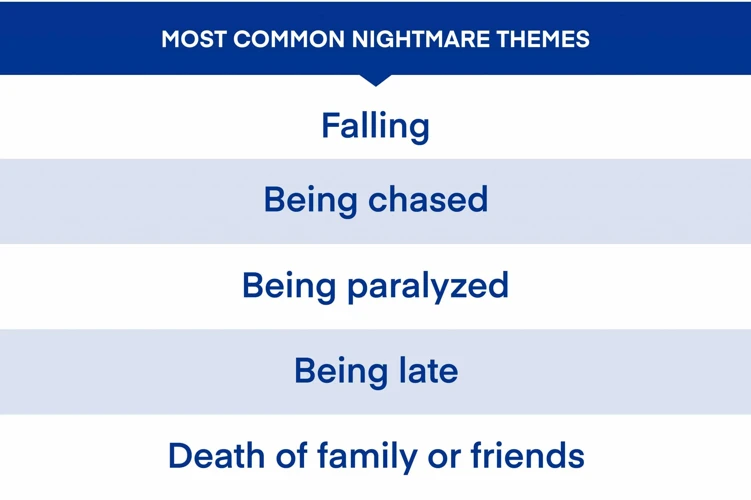Recurring nightmares can be a perplexing and distressing experience for many individuals. These vivid and often terrifying dreams can leave us feeling unsettled and anxious, affecting our overall well-being. It is important to understand the influence of past experiences on these recurring nightmares in order to address and overcome them. By exploring the connection between our past traumas, unresolved emotional issues, and the themes that manifest in our dreams, we can gain valuable insight into the deeper meaning behind these nightmares. In this article, we will delve into the characteristics of recurring nightmares, examine the role of past experiences in their formation, and explore strategies that can help us overcome these recurring nightmares.
Understanding Recurring Nightmares

Recurring nightmares are a type of dream that reoccur with a similar theme or storyline. These nightmares differ from regular dreams by their repetitive nature, often plaguing an individual night after night. They can create intense feelings of fear, anxiety, and dread, making it difficult to fall back asleep or get a restful night’s sleep. The vivid and distressing nature of recurring nightmares often leaves individuals feeling shaken and unsettled long after waking up. It is important to note that recurring nightmares are not just isolated incidents, but rather represent a pattern of dream content that persists over time.Tips for Breaking the Cycle of Recurring Nightmares
The frequency of recurring nightmares can vary from person to person. While some individuals may experience them on a nightly basis, others may have them less frequently, occurring once a week or even once a month. Common themes in recurring nightmares vary, but some of the most prevalent ones include falling, being chased, being trapped, being attacked, and experiencing feelings of helplessness or losing control. These nightmares often revolve around situations that evoke intense emotions and tap into our primal fears. Exploring the underlying reasons behind these recurring themes can provide valuable insights into their origin and potential resolution.Analyzing the Symbolism in Recurring Nightmares
Definition and Characteristics of Recurring Nightmares
Recurring nightmares are a specific type of dream characterized by their repetitive nature. Unlike regular dreams that occur infrequently and may not have a clear storyline, recurring nightmares present a consistent theme or plotline that reoccurs across multiple dreams. These nightmares can be extremely vivid and intense, often giving rise to strong emotions such as fear, anxiety, or helplessness. Individuals who experience recurring nightmares may find them difficult to forget or shake off, and the impact of these nightmares can extend beyond the sleep state, affecting their daily lives and overall well-being. It is important to note that these nightmares can vary in frequency, with some individuals experiencing them on a nightly basis while others have them less often. Unconscious Messages in Recurring Nightmares can provide further insight into the hidden meanings behind these recurrent dreams and their potential impact on our subconscious minds.
Frequency and Common Themes in Recurring Nightmares
Frequency and common themes play a significant role in understanding recurring nightmares. The frequency of recurring nightmares varies from person to person, with some individuals experiencing them more frequently than others. These nightmares can occur on a nightly basis or with less frequency, such as once a week or once a month. It is important to note that the frequency of recurring nightmares can impact an individual’s overall sleep quality and emotional well-being.
When it comes to the common themes in recurring nightmares, several prevail across different individuals. These themes often tap into our primal fears and evoke intense emotions. Some of the most common recurring nightmare themes include:
1. Falling: Falling from great heights is a recurring nightmare theme that leaves individuals feeling a sense of helplessness and fear of losing control.
2. Being chased: The feeling of being pursued or chased by an unknown entity or person in nightmares can generate high levels of anxiety and a sense of impending danger.
3. Being trapped: Being trapped in a confined space or unable to escape is another prevalent theme in recurring nightmares. These dreams can signify a feeling of being stuck or overwhelmed in waking life.
4. Being attacked: Nightmares involving physical attacks or threats can elicit feelings of vulnerability, fear, and powerlessness.
5. Helplessness or losing control: Dreams depicting situations where the individual feels helpless, unable to control their surroundings or circumstances, can be deeply distressing.
Understanding the frequency and common themes of recurring nightmares helps us recognize patterns and gain insight into their potential underlying causes. By identifying these themes and exploring their deeper meanings, individuals can take steps to address and overcome these recurring nightmares.
The Connection between Past Experiences and Nightmares

The connection between past experiences and nightmares is a complex and intricate one. Our dreams often serve as a window into our subconscious mind, reflecting the events, emotions, and traumas that we have experienced in the past. Childhood trauma can have a profound impact on the formation of nightmares in adulthood. Experiences such as physical or emotional abuse, neglect, or witnessing traumatic events can leave a lasting imprint on our psyche, resulting in the manifestation of these memories in our dreams. Individuals who have experienced trauma may find themselves reliving the events or themes associated with their past experiences in their nightmares.Uncovering the Unconscious Messages in Recurring Nightmares.
Post-traumatic stress disorder (PTSD) can also play a significant role in the development of recurring nightmares. Individuals who have been diagnosed with PTSD often experience intrusive thoughts, flashbacks, and nightmares relating to the traumatic event they have endured. These nightmares serve as a way for the mind to process and make sense of the traumatic experience, and can be seen as a symptom of the disorder itself.Effects of PTSD on Recurring Nightmares.
In addition to trauma-related influences, anxiety disorders and phobias can also contribute to the occurrence of recurring nightmares. Conditions such as generalized anxiety disorder, social anxiety disorder, and specific phobias can heighten feelings of fear, worry, and apprehension, which can then manifest in the form of recurring nightmares. The anxieties and fears that individuals experience during wakefulness can seep into their dream world, amplifying the intensity and distress of their nightmares.Influence of Anxiety Disorders and Phobias on Recurring Nightmares. Understanding the connection between past experiences and nightmares allows us to recognize the underlying factors at play and take steps towards addressing and resolving the recurring nightmares.
Influences and Triggers from Childhood Trauma
Childhood trauma plays a significant role in shaping our experiences and can have a profound impact on our mental well-being. It is not uncommon for individuals who have experienced childhood trauma to develop recurring nightmares later in life. The traumatic memories and emotions associated with these experiences can resurface during sleep, leading to nightmares that mirror the original trauma. In many cases, these nightmares serve as a way for the subconscious mind to process and integrate the unresolved emotions and memories from the past.
There are various influences and triggers from childhood trauma that can contribute to recurring nightmares. Here are a few key factors to consider:
1. Repressed memories: In some cases, individuals may have repressed or suppressed memories of traumatic events from their childhood. These memories may resurface in the form of nightmares, providing an opportunity for the individual to confront and process the suppressed emotions and experiences.
2. Emotional triggers: Certain stimuli or situations can act as triggers for recurring nightmares related to childhood trauma. These triggers can be anything that elicits strong emotions reminiscent of the traumatic event, such as a specific smell, sound, or even a particular location.
3. Unresolved feelings of fear and powerlessness: Childhood trauma often involves experiences that create a sense of fear, helplessness, or a loss of control. These emotions can linger into adulthood and manifest in recurring nightmares that reflect similar themes of being chased, attacked, or trapped.
4. Unhealthy coping mechanisms: Individuals who have experienced childhood trauma may develop unhealthy coping mechanisms, such as avoidance or dissociation. These mechanisms can contribute to the development of recurring nightmares as a way for the subconscious mind to bring attention to unresolved issues and encourage healing.
By understanding the influences and triggers from childhood trauma, individuals can begin to explore and address the underlying issues that contribute to their recurring nightmares. Seeking therapy or counseling can be a valuable step towards healing and finding resolution.
Effects of Post-Traumatic Stress Disorder (PTSD)
Post-Traumatic Stress Disorder (PTSD) is a psychological condition that can have a profound impact on an individual’s mental and emotional well-being. People who have experienced traumatic events, such as physical or sexual assault, accidents, natural disasters, or combat exposure, are at higher risk of developing PTSD. One of the hallmark symptoms of PTSD is the re-experiencing of traumatic events through nightmares and intrusive thoughts during waking hours. These nightmares may closely resemble the original trauma or incorporate elements related to it. The content of the nightmares is often disturbing and can evoke intense emotions and physiological reactions, such as sweating, rapid heartbeat, and hyperventilation. Individuals with PTSD may also experience avoidance symptoms, where they actively avoid reminders of the trauma, including triggers that could potentially lead to nightmares. Additionally, the hyperarousal symptoms of PTSD, such as heightened startle response and difficulty sleeping, can contribute to the formation of recurring nightmares. It is important to seek professional help for the treatment of PTSD, as it can have a significant impact on the quality of life and overall well-being of individuals affected by the disorder.
Influence of Anxiety Disorders and Phobias
Anxiety disorders and phobias can have a significant influence on the occurrence of recurring nightmares. Anxiety disorders, such as generalized anxiety disorder (GAD) or panic disorder, can cause heightened levels of anxiety and stress, which can manifest in nightmares during sleep. The fears and worries associated with these disorders may seep into our dreams, creating scenarios that reflect our deepest anxieties.
Phobias, which are characterized by intense and irrational fears of specific objects or situations, can also play a role in recurring nightmares. For example, someone with a phobia of spiders (arachnophobia) may have recurring nightmares involving spiders crawling all over them. These nightmares not only reflect the fear experienced during waking hours but can also reinforce the anxiety associated with the phobia itself.
It is worth noting that anxiety disorders and phobias can exacerbate the frequency and intensity of recurring nightmares. The heightened emotional arousal and increased levels of stress can disrupt sleep patterns and result in more frequent nightmares. Additionally, the fear and distress caused by recurring nightmares can further contribute to the development or worsening of anxiety disorders and phobias, creating a vicious cycle.
Uncovering Unresolved Emotional Issues

Uncovering unresolved emotional issues is a crucial step in understanding the root cause of recurring nightmares. These nightmares often serve as a reflection of our unconscious mind, revealing unprocessed traumatic memories, repressed emotions, and unresolved conflicts.
One major factor in recurring nightmares is the role of unprocessed traumatic memories. Events from the past that were particularly distressing or traumatic can resurface in our dreams, as the mind attempts to process and make sense of these experiences. These unresolved traumas may be related to childhood abuse, accidents, or any other deeply distressing event that has left a lasting impact on an individual’s psyche.
Repressed or suppressed emotions can also contribute to the occurrence of recurring nightmares. If we have not fully expressed or dealt with certain emotions, such as anger, guilt, or sadness, they may manifest in our dreams as intense and distressing situations. These dreams serve as a reminder that there are unresolved emotional issues that require attention and healing.
Unresolved conflicts and guilt can also play a significant role in recurring nightmares. Whether it’s a conflict with a loved one, a past mistake or wrongdoing, or a feeling of guilt over a certain event, these unresolved issues can manifest in our dreams. The mind uses dreams as a way to process and confront these conflicts, often in a symbolic or metaphorical manner.
In order to uncover and address unresolved emotional issues, it can be helpful to engage in therapeutic techniques such as journaling, therapy sessions, and dream analysis. These approaches can provide insights into the underlying emotions and experiences that are contributing to the recurring nightmares. By working through these unresolved emotional issues, individuals can begin to find healing and experience a reduction in the frequency and intensity of their nightmares.
The Role of Unprocessed Traumatic Memories
Unprocessed traumatic memories play a significant role in the development of recurring nightmares. When we experience a traumatic event, our brain may struggle to process and integrate the emotions and memories associated with it. These unprocessed traumatic memories can then resurface in our dreams, causing recurring nightmares that replay the events or emotions associated with the trauma. The content of these nightmares may closely resemble the original traumatic experience or contain symbolic representations of the emotions and situations involved.
These nightmares serve as a way for our subconscious mind to process and cope with the unresolved trauma. They provide an outlet for the intense emotions and fears associated with the event. The repetition of these nightmares can indicate that the trauma has not been fully processed or resolved, and our mind continues to grapple with its impact.
It is essential to address and heal these unprocessed traumatic memories to prevent the recurrence of nightmares. Therapeutic approaches such as trauma-focused therapy, including eye movement desensitization and reprocessing (EMDR), can help individuals make sense of the traumatic experiences and facilitate their integration into the overall narrative of their life. Resolving and processing traumatic memories can lead to a significant reduction in recurring nightmares and their associated distress.
Repressed or Suppressed Emotions and Nightmares
Recurring nightmares can often be connected to repressed or suppressed emotions within an individual. When we don’t fully process or express our emotions during our waking lives, they can find a way to manifest in our dreams. Emotions such as fear, anger, guilt, or sadness that we push aside during the day can resurface in our nightmares, seeking an outlet to be acknowledged and processed. These repressed or suppressed emotions can stem from past traumas, unresolved conflicts, or even societal pressures. They may lurk in our subconscious, waiting for an opportunity to be recognized, and night-time can serve as the perfect stage for them to come to the forefront. By examining the emotions that arise within our nightmares and connecting them to the experiences or situations in our waking lives, we can begin to unravel the underlying emotional turmoil that is contributing to these recurring nightmares. It is essential to address and work through these emotions in order to find resolution and alleviate the intensity of the nightmares.
Impact of Unresolved Conflicts and Guilt on Dreams
Unresolved conflicts and guilt can have a significant impact on our dreams, particularly when it comes to recurring nightmares. When we carry unresolved conflicts or guilt from past experiences, our subconscious mind often uses dreams as a way to process and address these unresolved emotions. These unresolved conflicts may stem from past relationships, traumatic events, or even internal battles with our own values and beliefs. In our dreams, these conflicts can manifest in various ways, creating scenarios where we find ourselves trapped in situations where there is no clear resolution. These dreams may depict arguments with loved ones that always end in frustration, or scenarios where we try to right a wrong but continually fail. These dreams can often leave us feeling frustrated, anxious, and overwhelmed, as we are unable to find closure or resolution in our sleep.
Guilt, too, plays a powerful role in shaping our dreams. It can manifest as recurring nightmares where we continuously relive a past mistake or harm that we have caused to ourselves or others. These dreams can be incredibly distressing and may be accompanied by feelings of shame and self-blame. Our subconscious mind uses these dreams as a way to confront and process the guilt that we carry, urging us to acknowledge and address the actions or decisions that still weigh heavily on our conscience. By exploring and working through these unresolved conflicts and guilt in our waking life, we can help alleviate the intensity of these recurring nightmares and find a sense of peace and closure.
Strategies to Overcome Recurring Nightmares

There are several effective strategies that can be employed to overcome recurring nightmares and reduce their impact on our lives. One therapeutic approach that has shown promise is Cognitive Behavioral Therapy (CBT). CBT focuses on identifying and challenging negative thought patterns and behaviors that contribute to nightmares. Through techniques such as exposure therapy, individuals can gradually confront their fears and desensitize themselves to the triggers that elicit nightmares. Additionally, practicing mindfulness and relaxation techniques can be helpful in managing stress and anxiety, which can contribute to the occurrence of recurring nightmares. Techniques such as deep breathing, meditation, and progressive muscle relaxation can aid in promoting a sense of calmness and tranquility before bedtime. Another useful tool is journaling and dream analysis. By keeping a dream journal and recording details of recurring nightmares, individuals can gain insight into recurring patterns, symbols, and emotions present in their dreams. This can enable them to uncover hidden meanings and explore ways to resolve underlying issues. By implementing these strategies and seeking professional help when necessary, individuals can take proactive steps towards breaking the cycle of recurring nightmares and improving their overall sleep quality.
Therapeutic Approaches, such as Cognitive Behavioral Therapy
Cognitive Behavioral Therapy (CBT) is a widely recognized and effective therapeutic approach for addressing recurring nightmares. This approach focuses on identifying and modifying the negative thought patterns and behaviors associated with nightmares. CBT aims to change the way individuals think and react to the content of their dreams, ultimately reducing the frequency and intensity of nightmares.
During CBT sessions, individuals work closely with a therapist to develop coping skills and strategies to manage their nightmares. One common technique used in CBT is called imagery rehearsal therapy (IRT). IRT involves rewriting the script of the nightmare and rehearsing a new, positive outcome in the mind before going to sleep. This process helps individuals develop a sense of control over their dreams and can reduce the distress associated with recurring nightmares.
Another aspect of CBT for recurring nightmares involves addressing any existing anxiety or PTSD symptoms that may be contributing to the nightmares. This may include exposure therapy, which gradually exposes individuals to the feared situations or triggers present in their nightmares. The goal is to desensitize individuals to these triggers and reduce their emotional impact.
In addition to CBT, other therapeutic approaches such as Eye Movement Desensitization and Reprocessing (EMDR) and psychodynamic therapy may also be beneficial in addressing recurring nightmares. EMDR focuses on processing traumatic memories through bilateral stimulation, such as eye movements or hand taps, while psychodynamic therapy explores the unconscious messages and underlying emotions connected to the nightmares.
Seeking professional help and exploring therapeutic approaches like CBT can provide individuals with valuable tools and support in overcoming their recurring nightmares. It is important to consult with a licensed therapist or healthcare professional to determine the most suitable treatment approach for individual needs.
Mindfulness and Relaxation Techniques
Mindfulness and relaxation techniques can be effective strategies for managing and reducing the frequency and intensity of recurring nightmares. Mindfulness, which involves being fully present and aware of our thoughts, feelings, and sensations, can help us develop a sense of control and reduce the impact of negative emotions. By practicing mindfulness, we can learn to observe our thoughts and emotions without judgment, which can lead to a reduction in anxiety and stress levels. This, in turn, can have a positive impact on our sleep quality and the occurrence of recurring nightmares.
There are various relaxation techniques that can complement mindfulness practices and promote a state of calmness and relaxation before bed. Deep breathing exercises, progressive muscle relaxation, and guided imagery are all examples of relaxation techniques that can help prepare the mind and body for sleep. Deep breathing exercises involve slow, deep breaths, focusing on the inhalation and exhalation to promote relaxation. Progressive muscle relaxation involves tensing and then releasing different muscle groups to induce a state of relaxation throughout the body. Guided imagery involves visualizing peaceful and soothing scenes or scenarios to calm the mind and promote sleep.
By incorporating these mindfulness and relaxation techniques into a bedtime routine, individuals may experience a decrease in anxiety and a greater sense of control over their dreams. It is important to note that these techniques may require practice and consistency to become effective, so patience and perseverance are key. Additionally, individuals may find it helpful to seek guidance from a mindfulness instructor or therapist who can provide additional support and guidance throughout the process.
Mindfulness and relaxation techniques can be valuable tools in managing and reducing the occurrence of recurring nightmares. By cultivating a sense of presence and awareness, individuals can develop greater control over their thoughts and emotions, which may ultimately lead to a more restful and peaceful sleep.
Journaling and Dream Analysis for Insight
Journaling and dream analysis can be powerful tools for gaining insight into recurring nightmares. Keeping a dream journal allows individuals to record and document their dreams in detail, enabling them to identify patterns, recurring themes, and emotions associated with their nightmares. By consistently writing down their dreams upon waking up, individuals can begin to notice common elements in their nightmares and the emotions they evoke. This process helps to create a deeper understanding of the underlying issues that may be influencing these recurring nightmares.
In addition to documenting the dreams, analyzing their symbolism and meaning can provide further insight. Dream analysis involves examining the various symbols, objects, and scenarios present in the dreams and interpreting their significance. This can be done by referencing dream dictionaries or seeking the guidance of a therapist or psychologist specializing in dream analysis. By delving into the symbolism of the nightmares, individuals can uncover buried emotions, unresolved conflicts, and unprocessed traumas that may be contributing to these recurring dreams.Uncovering the Unconscious Messages in Recurring Nightmares
When journaling and analyzing dreams, it is essential to approach the process with an open mind and a willingness to explore and reflect on the deeper meanings. While it may not offer an immediate solution to overcoming recurring nightmares, this self-reflective practice can provide valuable insights and serve as a stepping stone towards resolution and healing.
Seeking Professional Help
Seeking professional help is a crucial step in addressing and overcoming recurring nightmares. While some individuals may be able to manage their nightmares on their own, others may require the assistance of a therapist or sleep specialist. These professionals have the expertise and experience to delve deeper into the root causes of recurring nightmares and provide appropriate interventions. When considering seeking professional help, it is essential to be aware of certain indicators that may suggest the need for professional intervention. These indicators include:
- Severity and frequency: If the nightmares are severely impacting daily functioning or occurring with high frequency, it may be beneficial to consult a professional.
- Underlying trauma: If the nightmares are related to past traumas or unresolved emotional issues, a therapist can assist in processing and healing these experiences.
- Sleep disturbances: If the nightmares are causing significant sleep disruptions, leading to chronic insomnia or other sleep disorders, a sleep specialist can provide tailored interventions.
- Failed self-help strategies: If self-help strategies, such as relaxation techniques or journaling, have not been effective in alleviating recurring nightmares, seeking professional help can offer additional tools and support.
A therapist or sleep specialist can employ various therapeutic approaches to address recurring nightmares, such as:
- Cognitive Behavioral Therapy (CBT): CBT aims to identify and reframe negative thought patterns and beliefs associated with nightmares, helping individuals develop healthier coping mechanisms.
- Exposure therapy: This approach gradually exposes individuals to their fears and anxieties, allowing them to confront and overcome the underlying triggers of recurring nightmares.
- Eye Movement Desensitization and Reprocessing (EMDR): EMDR is a therapeutic technique that helps individuals process and integrate traumatic memories, reducing their impact on recurring nightmares.
It is essential to consult with a qualified professional who specializes in dream analysis or sleep disorders to ensure the most appropriate and effective treatment plan. Seeking professional help can provide individuals with the necessary support, guidance, and tools to break the cycle of recurring nightmares and restore peaceful sleep.
When to Consult a Therapist or Sleep Specialist
Knowing when to consult a therapist or sleep specialist is crucial in addressing recurring nightmares effectively. While occasional nightmares are a normal part of dreaming, there are certain signs and circumstances that indicate the need for professional help. If recurring nightmares significantly interfere with daily functioning, cause distress, or lead to a decline in overall well-being, it may be time to seek assistance. Here are some key indicators that suggest consulting a therapist or sleep specialist:
1. Frequent and Intense Nightmares: If you experience recurring nightmares on a regular basis and find them to be extremely distressing, it is advisable to seek professional guidance. A therapist can help determine the underlying causes and develop a treatment plan to alleviate the frequency and intensity of these dreams.
2. Prolonged Sleep Disturbances: When recurring nightmares disrupt your sleep patterns, leading to chronic insomnia or difficulty falling back asleep, consulting a sleep specialist may be beneficial. They can evaluate your sleep quality and suggest specific interventions to improve your overall sleep hygiene.
3. Impaired Daily Functioning: If recurring nightmares start to impact your daily life, such as causing persistent anxiety, fear, or avoidance of certain activities, it is essential to seek professional help. A therapist can assist in identifying coping strategies and therapeutic interventions to address the emotional distress caused by these nightmares.
4. Past Trauma: If the recurring nightmares stem from unresolved trauma, such as childhood abuse or a traumatic event, it is crucial to consult a trauma-informed therapist. They can provide appropriate support and guide you through the healing process.
5. Lack of Progress: If you have been attempting self-help strategies or employing relaxation techniques but continue to experience intense recurring nightmares, it may be time to seek professional assistance. A therapist or sleep specialist can offer alternative approaches and personalized treatment options to help you overcome these nightmares.
Remember, reaching out for professional help is not a sign of weakness, but rather a proactive step towards finding relief and improving your well-being.
Conclusion
In conclusion, understanding the influence of past experiences on recurring nightmares is crucial for addressing and overcoming these distressing dreams. Recurring nightmares are characterized by their repetitive nature, causing intense feelings of fear and anxiety. The frequency of recurring nightmares can vary, and they often revolve around common themes such as falling, being chased, or feeling trapped. By exploring the connection between past traumas, unresolved emotional issues, and the themes that manifest in our dreams, we can gain valuable insight into the underlying causes of these nightmares. Strategies to overcome recurring nightmares include therapeutic approaches like cognitive-behavioral therapy, mindfulness, and relaxation techniques, as well as journaling and dream analysis for insight. It is important to seek professional help when recurring nightmares significantly impact one’s daily life and well-being. By addressing the root causes of these nightmares and implementing effective coping mechanisms, individuals can find relief and reclaim their ability to sleep peacefully.
Frequently Asked Questions
FAQs About Recurring Nightmares
1. What causes recurring nightmares?
Recurring nightmares can be caused by a variety of factors, including unresolved trauma, anxiety disorders, post-traumatic stress disorder (PTSD), and unresolved emotional conflicts.
2. Are recurring nightmares common?
Recurring nightmares are relatively common, with approximately 5% to 8% of adults experiencing them regularly. However, the frequency and intensity can vary among individuals.
3. Can recurring nightmares be a sign of a sleep disorder?
While recurring nightmares can disrupt sleep patterns, they are not considered a sleep disorder in themselves. However, they can be associated with other sleep disorders like insomnia or sleep apnea.
4. How can I break the cycle of recurring nightmares?
Breaking the cycle of recurring nightmares may involve addressing the underlying causes, such as seeking therapy to process trauma or practicing relaxation techniques before bed. Explore tips for breaking the cycle of recurring nightmares.
5. Can recurring nightmares be a reflection of past experiences?
Yes, recurring nightmares often draw upon past experiences, including trauma or unresolved emotional conflicts. These dreams may serve as a means of processing and working through these experiences.
6. Are recurring nightmares only experienced by adults?
Recurring nightmares can affect individuals of all ages, including children. Children may experience nightmares related to specific fears or anxieties they are experiencing in their daily lives.
7. Can recurring nightmares be interpreted as messages from the unconscious mind?
Some individuals believe that recurring nightmares contain messages from the unconscious mind. Analyzing the symbolism and themes within these dreams can provide insights into unresolved issues or emotions.
8. How can recurring nightmares impact daily life?
Recurring nightmares can have a significant impact on daily life, leading to increased stress, anxiety, and a lack of restful sleep. They may also contribute to mood disturbances and decreased overall well-being.
9. Can medication help reduce recurring nightmares?
In some cases, medication can help alleviate the frequency or intensity of nightmares. However, it is important to consult with a healthcare provider to determine the most appropriate course of treatment.
10. When should I seek professional help for recurring nightmares?
If recurring nightmares are causing significant distress, disrupting daily life, or if they are accompanied by other symptoms like flashbacks or severe insomnia, it is advisable to seek the help of a therapist or sleep specialist.








